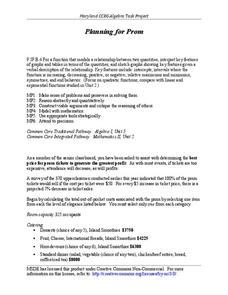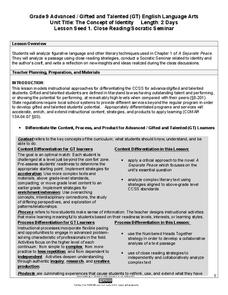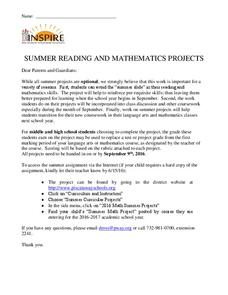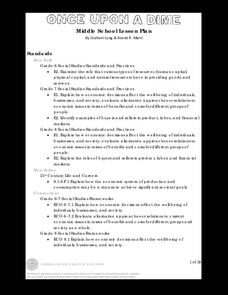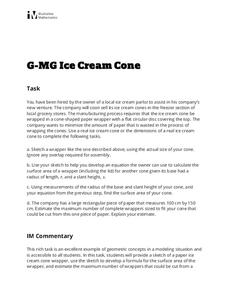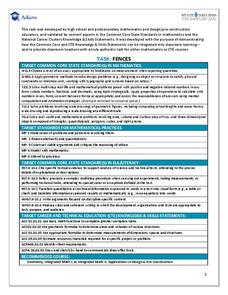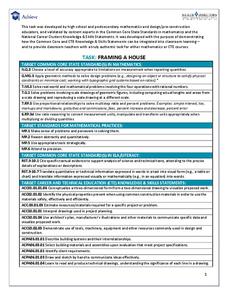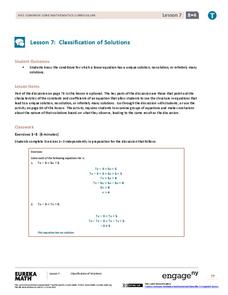Howard County Schools
Planning for Prom
Make the most of your prom—with math! Pupils write and use a quadratic model to determine the optimal price of prom tickets. After determining the costs associated with the event, learners use a graph to analyze the break even point(s).
Western Justice Center
Communication Skills
Good communication skills are key to resolving conflicts. A short video introduces learners to the concept of active listening and provides tips that will help them resolve conflicts. Class members then read articles, analyze scenarios,...
Balanced Assessment
Fermi Number
A fermi number is a rough estimate of a quantity that is difficult or impossible to measure. Individuals design a process for making an estimation of a given scenario. For example, they determine a plan for estimating the number of...
Maryland Department of Education
The Concept of Identity Lesson 1: Close Reading/Socratic Seminar
John Knowles' A Separate Peace provides readers with an opportunity to develop their close reading and analytical skills as they look for what Knowles feels are the factors that shape our identity.
Piscataway Township Schools
Bake Sale
Here is a project that instructs young bakers to calculate the ingredients needed for a cookie bake sale. The catch is that the ingredients for 32 cookies is given; however, pupils must figure out the amounts needed for 12 and 60...
Teach Engineering
Earthquakes Living Lab: Geology and Earthquakes in Japan
Sometimes it seems as if earthquakes hit the same places over and over again. Class members study Japan in order to determine why earthquakes keep happening there. Pairs work together to research and try to determine whether there are...
Achieve
Corn and Oats
How much land does a parcel hold? How much fertilizer does it take for a field of corn? Pupils answer these questions and more as they apply ratio reasoning and unit analysis.
Balanced Assessment
Catenary
Develop a model for a hanging chain. Pupils find a mathematical model for a hanging chain and then they compare their models to the precise function that models the curve. Scholars come up with a strategy to determine how close their...
EngageNY
The Structure of Ratio Tables—Additive and Multiplicative
Build tables by understanding their structure. Scholars take a closer look at the structure of ratio tables in the 10th segment in a 29-part series. Individuals realize that the tables can be built using an additive or multiplicative...
CK-12 Foundation
Rectangular to Polar Form for Equations: Polar Coordinates
Plot points around a wheel. Pupils use an interactive tool to plot a point using polar coordinates with the aid of a wheel. Scholars use the interactive to answer five questions to finish the lesson. The resource provides background...
EngageNY
More Practice with Box Plots
Don't just think outside of the box — read outside of it! The 15th lesson in a 22-part unit provides pupils more work with box plots. Learners read the box plots to estimate the five-number summary and interpret it within the context....
Federal Reserve Bank
Once Upon a Dime: Middle School Lesson Plan
Once Upon a Dime ... a group of middle schoolers wanted to learn about economics! Teach them complex economic concepts like supply and demand through a resource that effectively simplifies the explanations. Pupils work through various...
Concord Consortium
Rational and Not So Rational Functions
Do not cross the line while graphing. Provided with several coordinate axes along with asymptotes, pupils determine two functions that will fit the given restrictions. Scholars then determine other geometrical relationships of asymptotes...
Illustrative Mathematics
Ice Cream Cone
Every pupil with a sweet tooth will be clamoring for this lab and analysis, particularly when they're allowed to eat the results! Volume and surface area formulas for cones are developed from models, and then extended to the printing of...
Achieve
Fences
Pupils design a fence for a backyard pool. Scholars develop a fence design based on given constraints, determine the amount of material they need, and calculate the cost of the project.
Achieve
Framing a House
If members of your class wonder where they can use the math they learn in middle school, let them discover the answer. Learners apply geometry concepts of scale and measure to calculate the costs of framing a house addition.
Balanced Assessment
Confetti Crush
In the first part of a middle school assessment task, learners analyze a given statement about the amount of confetti revelers throw at Times Square on New Year's Eve. The second part of the task requires learners to identify objects...
Facing History and Ourselves
Socratic Seminar
New to the socratic seminar format? Check out a resource that not only provides the rationale for the procedure and step-by-step directions, but also provides a list of suggested topics, rules and model statements.
Curated OER
Osmosis and Dialysis
How do you engage pupils in a discussion about osmosis without leaving them overwhelmed? By providing them with the tools to perform an exciting experiment, and they will see osmosis in action! Young chemists and biologists use a potato...
Center for History and New Media
Slavery and Free Negroes, 1800 to 1860
What was life like for enslaved and free black people before the American Civil War? Explore the building tension between states and the freedom of individuals with a thorough social studies lesson. Learners of all ages explore primary...
EngageNY
Classification of Solutions
Is there one, none, or more? Through discussion or activity, scholars find the properties of an equation that will determine the number of solutions. They then use the properties discovered to figure out the number of solutions for a...
CK-12 Foundation
Identifying Sets of Pythagorean Triples: The iPad is a Pythagorean Triple
Compare iPad and HDTV aspect ratios. Individuals use the interactive to determine whether the measurements of screens represent a Pythagorean triple. The pupils determine what changes are needed to make a Pythagorean triple.
EngageNY
Describing Variability Using the Interquartile Range (IQR)
The 13th activity in a unit of 22 introduces the concept of the interquartile range (IQR). Class members learn to determine the interquartile range, interpret within the context of the data, and finish by finding the IQR using an...
CK-12 Foundation
Pythagorean Theorem to Determine Distance: Distance Between Friends
Pupils use an interactive to help visualize the right triangles needed to calculate distances between friends' houses. Individuals solve five problems on how to determine distances and comparing the distances.
Other popular searches
- Writing Open Ended Questions
- Math Open Ended Questions
- Reading Open Ended Questions
- Science Open Ended Questions
- Egypt Open Ended Questions
- Answer Open Ended Questions
- Answering Open Ended Questions
- Open Ended Questions Spa
- Writing Open Ended Questions
- Math Open Ended Questions
- Open Ended Questions Hspa
- Hspa Open Ended Questions


